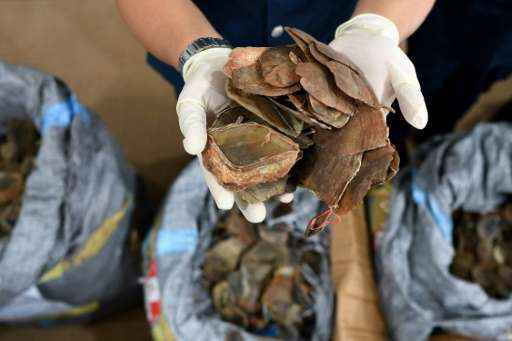A Malaysian customs official poses with seized pangolin scales on May 8, 2017. Pangolin scales are highly prized in Vietnam and China for supposed medicinal properties despite just being keratin, the same substance as fingernails
Malaysian customs officers have seized more than 700 kilograms of pangolin scales, the country's largest haul of the scales considered by some to have medicinal properties, officials said Monday.
The 712kg (1,570 pound) haul worth 9,184,800 ringgit ($2.12 million) was made last week in two separate seizures.
On May 2, eight gunny sacks of the scales weighing 408kg were found at a Kuala Lumpur airport warehouse. They are believed to have arrived on a flight from Accra, Ghana, which transited in Dubai.
Two days later, 10 more sacks weighing 304kg were found and seized. These were supposedly on a flight from Kinshasa, DR Congo, to Nairobi, Kenya, transiting in Dubai before reaching Kuala Lumpur.
Malaysian officials say they are investigating.
Pangolins are indigenous to the jungles of Indonesia, parts of Malaysia and areas of southern Thailand, and their meat is considered a delicacy in China.
They are classified as a protected species under the UN's Convention on International Trade in Endangered Species and international trade in any Asian pangolin species is banned under the convention.
The shy pangolin's brown scales are made of nothing more than keratin—the same substance as fingernails—but are highly prized in Vietnam and China where they are misleadingly touted as bearing medicinal properties.
Soaring demand for the products has seen an estimated one million pangolins plucked from Asian and African forests over the past decade, shunting them onto the list of species at the highest risk of extinction.
Wildlife officials have said pangolins face a serious threat from poachers and smugglers in Southeast Asia with inadequate punishment and lack of information encouraging the burgeoning trade.
© 2017 AFP
























